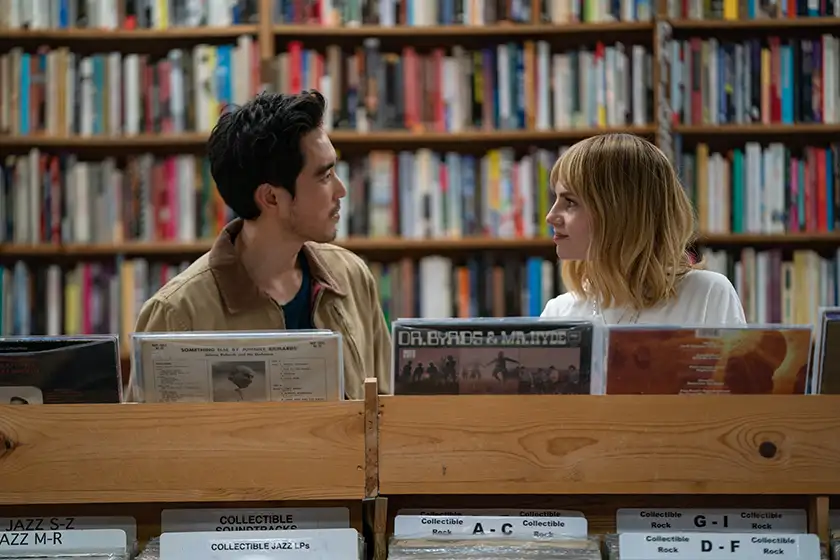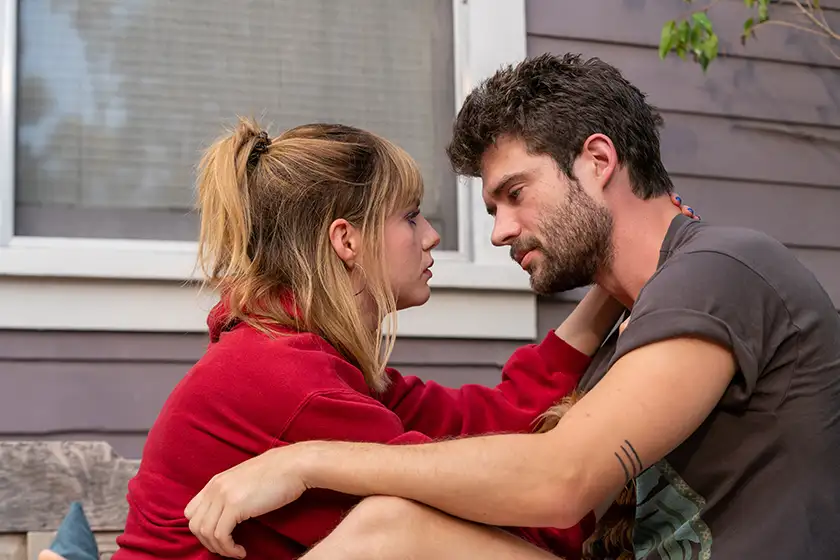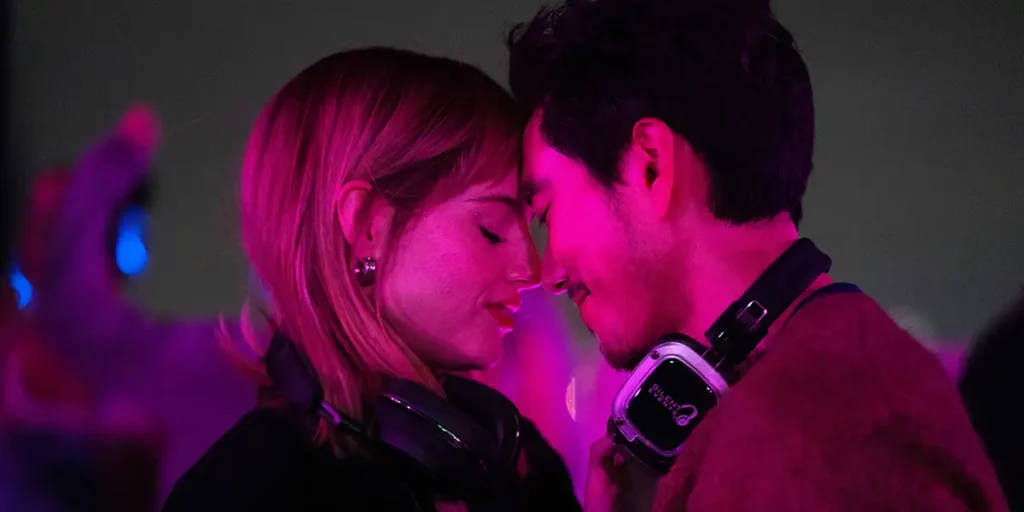Ned Benson delivers his most audacious piece of work yet in The Greatest Hits, an enrapturing exploration of grief through music with a career-defining turn from Lucy Boynton.
During one of the final scenes of Ned Benson’s The Greatest Hits, Harriet (Lucy Boynton, of Barbie) says that “the most terrifying and amazing part of being a human being” is “our capacity to move on.” This sentence perfectly encapsulates Harriet’s journey as she still finds difficulty grappling with the loss of the love of her life, Max (David Corenswet, of Pearl), two years after a tragic car accident.
The accident also left Harriet with a traumatic brain injury that caused her to travel back in time while listening to songs that have some form of connection between herself and Max. Throughout these two years, it’s implied that Harriet has tried to prevent Max from crashing his car but can never seem to stop the event from occurring. She’s since lived a quiet, isolated life, wearing noise-canceling headphones in public and largely avoiding music that could trigger her to travel back in time. She works at a library and sets “safe” zones with her best friend, Morris (Austin Crute, of Honk for Jesus. Save Your Soul.).
The soul shock Harriet experiences defines the carefully calculated visual language of the film, masterfully shot by cinematographer Chung Hoon-Chung, who gives his best work since Park Chan-wook’s The Handmaiden. From its first scene, where Harriet transports herself to the day of the crash by listening to The The’s “This is the Day,” the fixed camera moving as Harriet begins to drift in time, color changes, and lens flares strikingly expresses her distorted journey as she attempts to pick up the pieces in the wake of Max’s passing.
Anyone who’s experienced trauma can relate to Harriet’s experience: she’s purposefully attempting to control her life from any triggering element that could send her back into soul shock. The headphones act as a protective barrier to any potential trigger, but when she takes them off as she gets closer to comfort with newfound love interest David (Justin H. Min, of After Yang), triggers inevitably happen, and the visual treatment of them is almost overwhelming to describe.

As David and Harriet connect in a café over a Roxy Music record, Neil Francis’ “Music Sounds Better with You” begins to play in the café, which makes Harriet lock herself in the bathroom, her entire perception of reality distorted (the camera is fixed again as she dizzyingly transports herself back to the past), and she’s right back with Max playing checkers. While some may find the fragmented narrative underdeveloped, particularly in how one-note Max and Harriet’s relationship may be, it also isn’t the point.
There’s so much that Benson tells within the fragmented bits and pieces we get between Harriet and Max, because we’re seeing their relationship at its most passionate and loving – the way Harriet wants to remember it – not how it truly was. There’s a lot Benson doesn’t show us, and perhaps that could be detrimental to the character development of Corenswet’s Max. However, when you’ve lost someone close to your life, you tend to ignore the ‘worst’ moments you spent with the person. Perhaps you will attempt to relive the darkest moments with them, but some form of regret will stop you from going deep into it. You’d much rather focus on the most impactful and fulfilling moments with the person you’ve lost. This is how Harriet wants to remember Max, as imperfect as he could’ve been.
And this is how Benson beautifully showcases their almost prophetic relationship (when they meet, Harriet tells him she can see the future, which will “end tragically.”). Through Chung’s cinematography and Sara Haider’s sharp editing, Benson draws one of the most deeply human portraits of a relationship depicted in a film this decade: it’s messy, incomplete, frustrating but also profoundly romantic, beautiful, and soul-stirring, exactly how the path of life is defined by us all. There isn’t a single moment where we don’t buy into Harriet and Max’s relationship; Corenswet makes the most out of his limited screentime with a magnifying, sexy, and emotionally impactful turn (he’ll do pretty great as Superman, methinks. Charm levels are off the charts.).
Meanwhile, Boynton delivers the best performance of her career, one that’s less interested in her actions but instead focuses on her innate feelings, not only towards Max and David (Min continues to prove himself to be one of the best up-and-coming talents working today, post-After Yang and Shortcomings), but in how music shapes her identity and connection to life. Some of the film’s most powerful moments occur as Harriet listens to music, whether in a scene where she sings Nelly Furtado’s “I’m Like A Bird” or 10cc’s “I’m Not in Love” with David or at a silent DJ, where she opens herself up to David in a way that couldn’t be translated with words.

It also helps that Son Lux’s Ryan Lott gives the film’s sonic palette an ethereal, almost otherworldly sound as Harriet transports herself through time and space. He beautifully fills the space as she connects with David in a way that never detracts from what’s on-screen but beautifully complements the incredible work on display by both Boynton and Min. Without Lott’s powerful score, Benson’s almost overwhelming, emotionally textured experience would have missed one key piece of the puzzle. With it, The Greatest Hits overcomes some of the conventional trappings that most “time-travel movies exploring grief” treat. Instead, the movie breaks all the rules for an incredibly soul-shocking journey through grief and learning to move on even if the powers that be consistently try to pull you into the past.
Music itself has the power to transcend time and space. Without it, most of life has little to no meaning. I firmly believe this, even more so when we can attach a song to a strong memory. That’s why, whenever a loved one passes away, we tend to play some of their favorite songs at their funerals – songs that not only did they love , but that perfectly represented who they were as individuals. Songs connect us to ourselves and the people we know, making us understand life just a bit more, as messy, unpredictable, and difficult as waking up in the morning may be.
Harriet and her connection with Max and David in The Greatest Hits made me think about Diana Ross’ “I Thought It Took a Little Time (But Today I Fell in Love).” Ross sings about not believing in “love at first sight,” until her connection with someone she hardly knew “was so unexpected/I could hardly keep myself collected.” Harriet expresses these powerful feelings from the minute she shares a joint with Max and takes the leap of faith, drastically (and knowingly) changing her life, enjoying each moment of intimacy she spends with him until the end occurs. When she’s challenged to take that leap again as she travels back in time, her feelings are so strong that she clearly doesn’t want to let them go. But since “our capacity to move on” is so strong, as terrifying as it is, perhaps she’ll be all right in the end.
The Greatest Hits had a limited theatrical release on April 5, 2024 and is now available to watch on Hulu / Disney Plus.

